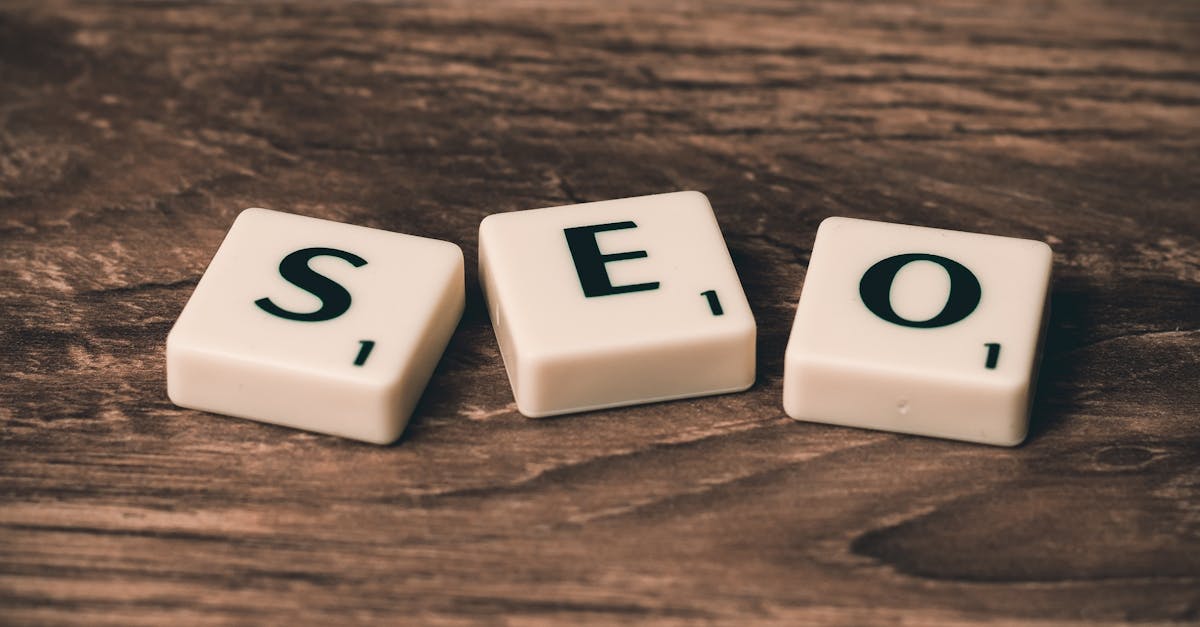
Table Of Contents
Keyword Strategy
Keyword strategy forms the backbone of both Search Engine Optimisation (SEO) and Pay-Per-Click (PPC) Advertising. Identifying the right keywords is essential, as it directly influences the visibility and effectiveness of campaigns. For SEO, keywords should be tailored to match user intent over the long term, while PPC requires a more immediate focus on high-converting terms. This often involves a deeper level of research to uncover which keywords are driving traffic and conversions effectively, allowing businesses to allocate their budgets efficiently.
In PPC, keyword selection can determine the success of ad spending. Advertisers must consider factors like search volume, competition, and cost-per-click bids. Analysing competitors provides insights into which keywords are performing well in the market. In contrast, SEO strategies might pivot around broader keywords with less immediate returns but potential for long-term gains. A well-defined keyword strategy in both areas can significantly enhance overall marketing efforts, ensuring that resources are directed towards the most impactful terms for brand visibility and consumer engagement.
Research Techniques for PPC and SEO
Research techniques play a crucial role in both Pay-Per-Click (PPC) Advertising and Search Engine Optimisation (SEO). For PPC, keyword research focuses on identifying high-performing keywords that align with user intent and are likely to drive conversions. Tools like Google Ads Keyword Planner and SEMrush can provide insights into search volumes, competition levels, and cost-per-click estimates, enabling advertisers to make informed decisions about their bidding strategies.
In contrast, SEO requires a more nuanced approach to keyword research. While tools such as Ahrefs and Moz offer valuable data on keyword difficulty and organic search traffic, understanding user behaviour and trends is essential for crafting effective content strategies. Analysing competitors' keywords and exploring long-tail variations can provide a clearer picture of opportunities in the marketplace. Ultimately, effective research techniques for both PPC and SEO are foundational to maximising visibility and achieving marketing goals.
Performance Metrics
When evaluating the effectiveness of digital marketing strategies, performance metrics play a crucial role in determining success. Pay-Per-Click (PPC) Advertising allows marketers to track immediate results. Metrics such as click-through rates, conversion rates, and cost per acquisition provide insights into how well the ads are performing. These indicators help in adjusting campaigns for better outcomes, enabling quicker responsiveness to market changes.
In contrast, the performance metrics associated with SEO tend to unfold over a more extended timeframe. While it may take longer to see rankings improve and organic traffic increase, these metrics are valuable for assessing the long-term impact of content and keyword strategies. Organic visibility, session duration, and engagement rates are critical in understanding how effectively the optimised content resonates with the target audience. Balancing these metrics from both PPC and SEO can provide a comprehensive view of a marketing strategy's effectiveness.
Measuring Success in PPC Campaigns
Measuring success in Pay-Per-Click (PPC) Advertising involves analysing various key performance indicators (KPIs) that directly impact the return on investment. The most common metrics include click-through rate (CTR), conversion rate, and cost per acquisition (CPA). A high CTR suggests that your ads are resonating with your audience, while a solid conversion rate indicates effective landing pages and messaging. Monitoring CPA allows marketers to determine the financial efficiency of their campaigns, ensuring that ad spend aligns with overall business objectives.
Another important aspect of measuring PPC success is the utilisation of A/B testing. This method enables marketers to experiment with different ad copies, visuals, and targeting strategies to optimise campaign performance. Regular analysis of these tests can provide insights into audience behaviour and improve future ad efforts. Integrating tracking tools such as Google Analytics can further enhance the ability to attribute success to specific campaigns, leading to more data-driven decisions in the realm of Pay-Per-Click (PPC) Advertising.
Time Investment
When considering time investment, Pay-Per-Click (PPC) Advertising often offers immediate visibility. Campaigns can be set up and launched in a matter of hours, allowing businesses to see traffic and engagement almost instantly. This quick turnaround can be particularly advantageous for companies seeking to promote time-sensitive offers or newly launched products. Continuous monitoring and optimisation are necessary to maintain performance, requiring dedicated time and focus.
In contrast, Search Engine Optimisation (SEO) demands a longer commitment before yielding results. It involves ongoing content creation, backlink development, and technical adjustments to improve organic search rankings. The process can take months to establish a strong online presence. Although the initial investment of time may be higher, the benefits of sustained traffic and ongoing visibility can outweigh the effort in the long term.
The Timeframe for PPC Results vs. SEO
Pay-Per-Click (PPC) Advertising offers immediate visibility and results, making it an appealing choice for businesses seeking quick returns. Once a campaign is launched, ads can begin generating traffic within hours, allowing companies to start collecting data and making adjustments in real-time. This speed can be particularly beneficial for promotions or events that require rapid outreach.
In contrast, SEO is a long-term strategy that usually requires several months of consistent effort before tangible results emerge. Optimising a website for search engines involves several stages, including keyword research, content creation, and link building. The cumulative effects of these actions develop over time, leading to a gradual increase in organic traffic and rankings. Businesses might need to be patient, as the benefits of SEO can span well beyond initial investments, ultimately leading to sustainable growth.
FAQS
What is the main difference between PPC and SEO?
The main difference between PPC (Pay-Per-Click) and SEO (Search Engine Optimisation) lies in their approach to traffic generation. PPC involves paying for advertisements that appear on search engines or social media platforms, while SEO focuses on optimising website content to improve organic search rankings without direct payment for clicks.
Which strategy yields quicker results, PPC or SEO?
PPC typically yields quicker results than SEO. With PPC, you can start seeing traffic as soon as your campaign goes live, whereas SEO efforts often take time to build momentum and improve rankings in search engine results.
Is PPC more cost-effective than SEO in the long run?
It depends on various factors, including your business goals, competition, and budget. While PPC can provide immediate visibility, the costs can accumulate over time. SEO, although requiring an initial investment of time and resources, can lead to sustainable organic traffic without ongoing costs per click.
Can I use PPC and SEO together in my marketing strategy?
Yes, using PPC and SEO together can complement your marketing strategy. PPC can drive immediate traffic while your SEO efforts work to build long-term organic visibility. This combined approach can enhance overall performance and reach different audience segments.
How do I measure the success of my PPC and SEO efforts?
Success can be measured using different performance metrics. For PPC, metrics like click-through rates (CTR), conversion rates, and return on ad spend (ROAS) are commonly used. For SEO, you can measure success through organic traffic growth, keyword rankings, and engagement metrics such as bounce rate and time on site.

















































